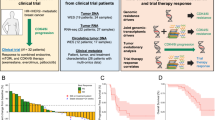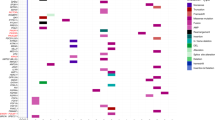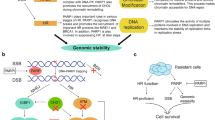Abstract
Background:
Preclinical drug screens identified disulfiram as a potent in vitro inhibitor of prostate cancer (PCa) cell growth. Although many mechanisms for its anticancer activity have been proposed, tumor suppressor gene re-expression through promoter demethylation emerged as one of the more plausible.
Methods:
We conducted an open-label, dose escalation trial of disulfiram in men with non-metastatic recurrent PCa after local therapy. Dose escalation occurred if a demethylating ‘response’ (that is, ⩾10% decrease in peripheral blood mononuclear cell (PBMC) global 5-methyl cytosine (5meC) content) was observed in <3 patients in cohort 1. Cohorts 1 and 2 received disulfiram 250 mg and 500 mg daily, respectively. The primary end point was the proportion of subjects with a demethylation response. Secondary end points included the rate of PSA progression at 6 months, changes in PSA doubling time and safety/tolerability.
Results:
Changes in global 5meC content were observed in two of nine patients (22.2%) in cohort 1 and 3 of 10 (30.0%) in cohort 2. Only five subjects were on trial for ⩾6 months, all were in cohort 1 and all had PSA progression by 6 months. No changes in PSA kinetics were observed in either cohort. Disulfiram was poorly tolerated with six patients experiencing grade 3 adverse events (three per cohort). Three of the responders displayed pretreatment instability in their 5meC content.
Conclusions:
A minority of patients had transient global PBMC demethylation changes. Instability in 5meC may limit the reproducibility of these findings, limiting our ability to confirm our hypothesis. Given the toxicities and no clinical benefits, further development of disulfiram should not be pursued in this population.
This is a preview of subscription content, access via your institution
Access options
Subscribe to this journal
Receive 4 print issues and online access
$259.00 per year
only $64.75 per issue
Buy this article
- Purchase on Springer Link
- Instant access to full article PDF
Prices may be subject to local taxes which are calculated during checkout

Similar content being viewed by others
References
Nelson WG, De Marzo AM, Yegnasubramanian S . Epigenetic alterations in human prostate cancers. Endocrinology 2009; 150: 3991–4002.
Yegnasubramanian S, Kowalski J, Gonzalgo ML, Zahurak M, Piantadosi S, Walsh PC et al. Hypermethylation of CpG islands in primary and metastatic human prostate cancer. Cancer Res 2004; 64: 1975–1986.
Yegnasubramanian S, Haffner MC, Zhang Y, Gurel B, Cornish TC, Wu Z et al. DNA hypomethylation arises later in prostate cancer progression than CpG island hypermethylation and contributes to metastatic tumor heterogeneity. Cancer Res 2008; 68: 8954–8967.
Aryee MJ, Liu W, Engelmann JC, Nuhn P, Gurel M, Haffner MC et al. DNA methylation alterations exhibit intraindividual stability and interindividual heterogeneity in prostate cancer metastases. Sci Transl Med 2013; 5: 169ra10.
Bird AP . CpG-rich islands and the function of DNA methylation. Nature 1986; 321: 209–213.
Mack GS . Epigenetic cancer therapy makes headway. J Natl Cancer Inst 2006; 98: 1443–1444.
Muller CI, Ruter B, Koeffler HP, Lubbert M . DNA hypermethylation of myeloid cells, a novel therapeutic target in MDS and AML. Curr Pharm Biotechnol 2006; 7: 315–321.
Lin J, Haffner MC, Zhang Y, Lee BH, Brennen WN, Britton J et al. Disulfiram is a DNA demethylating agent and inhibits prostate cancer cell growth. Prostate 2011; 71: 333–343.
Iljin K, Ketola K, Vainio P, Halonen P, Kohonen P, Fey V et al. High-throughput cell-based screening of 4910 known drugs and drug-like small molecules identifies disulfiram as an inhibitor of prostate cancer cell growth. Clin Cancer Res 2009; 15: 6070–6078.
Jeltsch A . Beyond Watson and Crick: DNA methylation and molecular enzymology of DNA methyltransferases. Chembiochem 2002; 3: 274–293.
Marikovsky M, Nevo N, Vadai E, Harris-Cerruti C . Cu/Zn superoxide dismutase plays a role in angiogenesis. Int J Cancer 2002; 97: 34–41.
Shian SG, Kao YR, Wu FY, Wu CW . Inhibition of invasion and angiogenesis by zinc-chelating agent disulfiram. Mol Pharmacol 2003; 64: 1076–1084.
Yakisich JS, Siden A, Eneroth P, Cruz M . Disulfiram is a potent in vitro inhibitor of DNA topoisomerases. Biochem Biophys Res Commun 2001; 289: 586–590.
Wang W, McLeod HL, Cassidy J . Disulfiram-mediated inhibition of NF-kappaB activity enhances cytotoxicity of 5-fluorouracil in human colorectal cancer cell lines. Int J Cancer 2003; 104: 504–511.
Liu GY, Frank N, Bartsch H, Lin JK . Induction of apoptosis by thiuramdisulfides, the reactive metabolites of dithiocarbamates, through coordinative modulation of NFkappaB, c-fos/c-jun, and p53 proteins. Mol Carcinog 1998; 22: 235–246.
Kim CH, Kim JH, Moon SJ, Hsu CY, Seo JT, Ahn YS . Biphasic effects of dithiocarbamates on the activity of nuclear factor-kappaB. Eur J Pharmacol 2000; 392: 133–136.
Cho HJ, Lee TS, Park JB, Park KK, Choe JY, Sin DI et al. Disulfiram suppresses invasive ability of osteosarcoma cells via the inhibition of MMP-2 and MMP-9 expression. J Biochem Mol Biol 2007; 40: 1069–1076.
Cen D, Gonzalez RI, Buckmeier JA, Kahlon RS, Tohidian NB, Meyskens FL Jr. . Disulfiram induces apoptosis in human melanoma cells: a redox-related process. Mol Cancer Ther 2002; 1: 197–204.
Daniel KG, Chen D, Orlu S, Cui QC, Miller FR, Dou QP . Clioquinol and pyrrolidine dithiocarbamate complex with copper to form proteasome inhibitors and apoptosis inducers in human breast cancer cells. Breast Cancer Res 2005; 7: R897–R908.
Chen D, Cui QC, Yang H, Dou QP . Disulfiram, a clinically used anti-alcoholism drug and copper-binding agent, induces apoptotic cell death in breast cancer cultures and xenografts via inhibition of the proteasome activity. Cancer Res 2006; 66: 10425–10433.
Chen D, Peng F, Cui QC, Daniel KG, Orlu S, Liu J et al. Inhibition of prostate cancer cellular proteasome activity by a pyrrolidine dithiocarbamate-copper complex is associated with suppression of proliferation and induction of apoptosis. Front Biosci 2005; 10: 2932–2939.
Lovborg H, Oberg F, Rickardson L, Gullbo J, Nygren P, Larsson R . Inhibition of proteasome activity, nuclear factor-KappaB translocation and cell survival by the antialcoholism drug disulfiram. Int J Cancer 2006; 118: 1577–1580.
Huang WY, Su LJ, Hayes RB, Moore LE, Katki HA, Berndt SI et al. Prospective study of genomic hypomethylation of leukocyte DNA and colorectal cancer risk. Cancer Epidemiol Biomarkers Prev 2012; 21: 2014–2021.
Johansson B . A review of the pharmacokinetics and pharmacodynamics of disulfiram and its metabolites. Acta Psychiatr Scand Suppl 1992; 369: 15–26.
Scher HI, Eisenberger M, D’Amico AV, Halabi S, Small EJ, Morris M et al. Eligibility and outcomes reporting guidelines for clinical trials for patients in the state of a rising prostate-specific antigen: recommendations from the Prostate-Specific Antigen Working Group. J Clin Oncol 2004; 22: 537–556.
Bjornsson HT, Sigurdsson MI, Fallin MD, Irizarry RA, Aspelund T, Cui H et al. Intra-individual change over time in DNA methylation with familial clustering. JAMA 2008; 299: 2877–2883.
Henry NL, Dunn R, Merjaver S, Pan Q, Pienta KJ, Brewer G et al. Phase II trial of copper depletion with tetrathiomolybdate as an antiangiogenesis strategy in patients with hormone-refractory prostate cancer. Oncology 2006; 71: 168–175.
Lin J, Beer TM, Ryan CJ, Mathew P, Wilding G, Morris M et al. A randomized, phase II study of ATN-224 in patients with biochemically relapsed, hormone-naive prostate cancer: A DOD/PCF Prostate Cancer Clinical Trials Consortium trial. J Clin Oncol 2009; 27: 15s.
Acknowledgements
This study was supported by NIH/NCI CA58236, Commonwealth Foundation; David H Koch Charitable Foundation; DOD no. W81XWH-09-1-0149; DOD; Cancer Center Core Grant P30 CA006973. This research was supported by the Analytical Pharmacology Core of the Sidney Kimmel Comprehensive Cancer Center at Johns Hopkins (NIH grants P30 CA006973 and UL1 RR 025005) and the Shared Instrument Grant (1S10RR026824-01). The project described was supported in part by Grant Number UL1 RR 025005 from the National Center for Research Resources (NCRR), a component of the National Institutes of Health (NIH) and NIH Roadmap for Medical Research, and its contents are solely the responsibility of the authors and do not necessarily represent the official view of NCRR or NIH.
Author information
Authors and Affiliations
Corresponding author
Ethics declarations
Competing interests
The authors declare no conflict of interest.
Rights and permissions
About this article
Cite this article
Schweizer, M., Lin, J., Blackford, A. et al. Pharmacodynamic study of disulfiram in men with non-metastatic recurrent prostate cancer. Prostate Cancer Prostatic Dis 16, 357–361 (2013). https://doi.org/10.1038/pcan.2013.28
Received:
Revised:
Accepted:
Published:
Issue Date:
DOI: https://doi.org/10.1038/pcan.2013.28
Keywords
This article is cited by
-
Cuproptosis: mechanisms and links with cancers
Molecular Cancer (2023)
-
Mouse pharmacokinetics and metabolism of the phenylurea thiocarbamate NSC 161128
Cancer Chemotherapy and Pharmacology (2022)
-
Transcription factor p8 regulates autophagy in response to disulfiram via PI3K/mTOR/p70S6K signaling pathway in pancreatic cancer cells
Human Cell (2022)
-
Disulfiram: a novel repurposed drug for cancer therapy
Cancer Chemotherapy and Pharmacology (2021)
-
A Phase 1 dose-escalation study of disulfiram and copper gluconate in patients with advanced solid tumors involving the liver using S-glutathionylation as a biomarker
BMC Cancer (2021)



